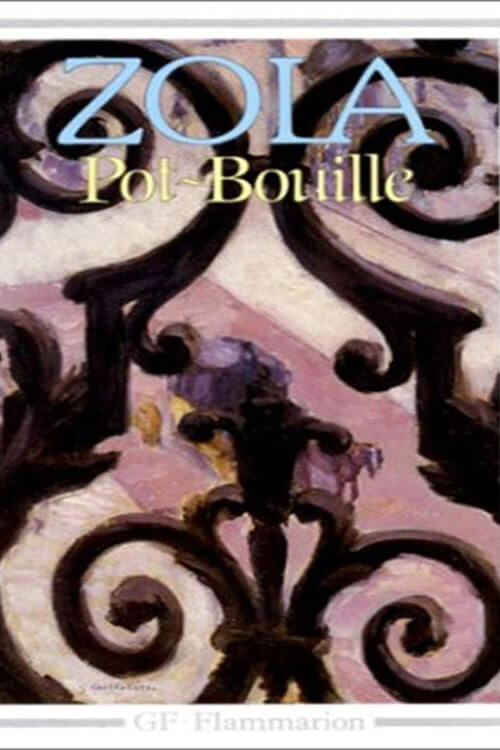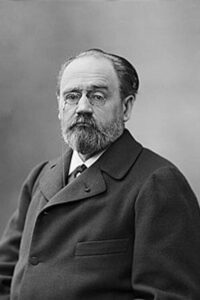
Pot-bouille
Confused by cars, Rue Neuve-Saint-Augustin stopped the cab loaded with three trunks, which was bringing Octave from the Gare de Lyon. The young man lowered the window of a door despite the already bitter cold of this dark November afternoon. He remained surprised by the sudden fall of daylight in this neighbourhood with its narrow streets, all teeming with crowds. The curses of the coachmen hitting the snorting horses, the endless elbowing of the sidewalks, and the hurrying lines of shops overflowing with clerks and customers dazed him because, if he had dreamed of a cleaner Paris, he did not hope for such harsh commerce, he felt it was publicly open to the appetites of strong fellows.
The driver leaned over.
—Is it Passage Choiseul?
—But no, rue de Choiseul…. A new house, I think.
The cab only had to turn, the house was the second, a large house of four floors, whose stone retained a barely scorched paleness, in the middle of the rusty plaster of the old neighboring facades. Octave, who had gone down to the sidewalk, measured it, studied it with a mechanical glance, from the silk shop on the ground floor and the mezzanine to the recessed windows on the fourth floor, opening onto a narrow terrace. On the first floor, women’s heads supported a balcony with a very ornate cast iron railing. The windows had complicated frames, roughly cut on stencils; and, below, above the carriage door, even more laden with ornaments, two cupids were unrolling a cartridge, where the number was, which an interior gas lamp illuminated at night.
A big blond gentleman, who was coming out of the vestibule, stopped short when he saw Octave.
-How! here you are! he shouted. But I was only counting on you tomorrow!
“My goodness,” replied the young man, “I left Plassans a day earlier…. Is the room not ready?
-Oh! if…. I had rented for two weeks, and I furnished it right away, as you asked me. Wait, I want to settle you down.
He returned, despite Octave’s entreaties. The coachman had brought down the three trunks. Standing in the concierge’s box, a dignified man, with a long, shaved diplomatic face, was gravely perusing the Moniteur. However, he deigned to worry about these trunks which were placed under his door; and, going forward, he asked his tenant, the architect of the third, as he called him:
—Mr. Campardon, is this the person?
—Yes, Mr. Gourd, it is Mr. Octave Mouret, for whom I rented the room on the fourth floor. He will sleep up there and take his meals with us…. Mr. Mouret is a friend of my wife’s parents, whom I recommend to you.
Octave looked at the entrance, with faux marble panels and whose vault was decorated with rosettes. The courtyard at the back, paved and cemented, had a great air of cold cleanliness; alone, a coachman, at the stable door, rubbed a bit with a skin. The sun should never go down there.
Meanwhile, Mr. Gourd was examining the trunks. He pushed them with his foot, became respectful of their weight, and talked about going to get a messenger to take them up the back staircase.
“Madame Gourd, I’m going out,” he cried, leaning into the box.
This lodge was a small lounge, with clear mirrors, covered with a red flowered carpet and furnished with rosewood; and, through a half-open door, one could see a corner of the bedroom, a bed draped in garnet repaint. Madame Gourd, very fat, wearing yellow ribbons, was lying in an armchair, hands folded, doing nothing.
Read or download Book
Émile Zola
Émile Édouard Charles Antoine Zola (2 April 1840 – 29 September 1902) was a French novelist, journalist, playwright, the best-known practitioner of the literary school of naturalism, and an important contributor to the development of theatrical naturalism.
Biography.
He was a major figure in the political liberalization of France and in the exoneration of the falsely accused and convicted army officer Alfred Dreyfus, which is encapsulated in his renowned newspaper opinion headlined J’Accuse…! Zola was nominated for the first and second Nobel Prize in Literature in 1901 and 1902.
Early life
Zola was born in Paris in 1840 to François Zola (originally Francesco Zolla) and Émilie Aubert. His father was an Italian engineer with some Greek ancestry, who was born in Venice in 1795, and engineered the Zola Dam in Aix-en-Provence; his mother was French. The family moved to Aix-en-Provence in the southeast when Émile was three years old. Four years later, in 1847, his father died, leaving his mother on a meager pension. In 1858, the Zolas moved to Paris, where Émile’s childhood friend Paul Cézanne soon joined him. Zola started to write in the romantic style. His widowed mother had planned a law career for Émile, but he failed his baccalauréat examination twice.
Later life
In 1862 Zola was naturalized as a French citizen. In 1865, he met Éléonore-Alexandrine Meley, who called herself Gabrielle, a seamstress, who became his mistress. They married on 31 May 1870. Together they cared for Zola’s mother. She stayed with him all his life and was instrumental in promoting his work. The marriage remained childless. Alexandrine Zola had a child before she met Zola that she had given up because she was unable to take care of it. When she confessed this to Zola after their marriage, they went looking for the girl, but she had died a short time after birth.
In 1888, he was given a camera, but he only began to use it in 1895 and attained a near-professional level of expertise. Also in 1888, Alexandrine hired Jeanne Rozerot, a 21-year-old seamstress who was to live with them in their home in Médan. The 48-year-old Zola fell in love with Jeanne and fathered two children with her: Denise in 1889 and Jacques in 1891. After Jeanne left Médan for Paris, Zola continued to support and visit her and their children. In November 1891 Alexandrine discovered the affair, which brought the marriage to the brink of divorce. The discord was partially healed, which allowed Zola to take an increasingly active role in the lives of the children. After Zola’s death, the children were given his name as their lawful surname.
Career
During his early years, Zola wrote numerous short stories and essays, four plays, and three novels. Among his early books was Contes à Ninon, published in 1864. With the publication of his sordid autobiographical novel La Confession de Claude (1865) attracting police attention, Hachette fired Zola. His novel Les Mystères de Marseille appeared as a serial in 1867. He was also an aggressive critic, his articles on literature and art appearing in Villemessant’s journal L’Événement. After his first major novel, Thérèse Raquin (1867), Zola started the series called Les Rougon-Macquart.
In Paris, Zola maintained his friendship with Cézanne, who painted a portrait of him with another friend from Aix-en-Provence, writer Paul Alexis, entitled Paul Alexis Reading to Zola.






